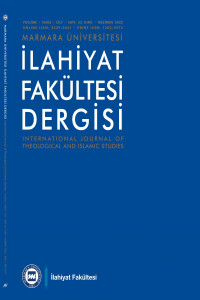Ahmet Aydın. Yavana: İslam Medeniyetinin Büyük Havzası/Hint. İstanbul: Ketebe Yayınları, 2021, 372 sayfa.
Abstract
Yavana: İslam Medeniyetinin Büyük Havzası/Hint” başlığını taşıyan eser, Müslümanların Hint alt kıtasındaki serüvenini “Tanıma (Gazneliler)”, “Yerleşme (Delhi Türk Sultanlığı)” ve “Kökleşme (Babürlüler)” olmak üzere üç ana bölüme ayırarak ilmî, mimari ve sanatsal açılardan bölgenin İslam medeniyetine katkılarını incelemeyi hedefler. Genel olarak okuyucuya Hint alt kıtasındaki Türk-İslam ilim havzasının bütüncül bir resmini sunan “Yavana”, araştırmacılara Hint havzası ile ilgili neler yapılabileceğine dair ışık tutan değerli bir çalışmadır. Ancak çalışmanın neden Hintliler tarafından Müslümanlar için, onların kendilerinden daha aşağı olduklarını ifade etmek üzere “öteki, yabancı, istilacı, görgüsüz, bilgisiz” anlamında olumsuz bir niteleme olarak kullandıkları “Yavana” kavramı ile isimlendirildiği izaha muhtaçtır. Dikkat çekici olsa da isimlendirmenin içerik ile uyumlu olduğunu söylemek mümkün değildir.
Keywords
Ahmet Aydın. Yavana: Great Basin of Islamic Civilization/India. İstanbul: Ketebe Yayınları, 2021, 372 p.
Abstract
The work, titled Yavana: The Great Basin of Islamic Civilization/Indian”, divides the adventure of Muslims in the Indian subcontinent into three main sections: “Recognition (Ghaznavids)”, “Settlement (Delhi Turkish Sultanate)” and “Rooting (Mughals)”. It aims to examine the contribution of the region to the Islamic civilization in artistic terms. In general, "Yavana", which presents the reader with a holistic picture of the Turkish-Islamic scientific basin in the Indian subcontinent, is a valuable study that sheds light on what can be done to researchers about the Indian basin. However, it is necessary to explain why the study was named by the Indians with the concept of "Yavana", which is used as a negative characterization for Muslims in the sense of "other, foreign, invader, rude, ignorant" to express that they are inferior to them. Although it is remarkable, it is not possible to say that the naming is compatible with the content.
Keywords
Details
| Primary Language | Turkish |
|---|---|
| Journal Section | Book Review |
| Authors | |
| Publication Date | June 27, 2022 |
| Published in Issue | Year 2022 Volume: 62 Issue: 62 |
International Journal of Theological and Islamic Studies
International Journal of Theological and Islamic Studies is an open access journal
Click for Open Access Policy

